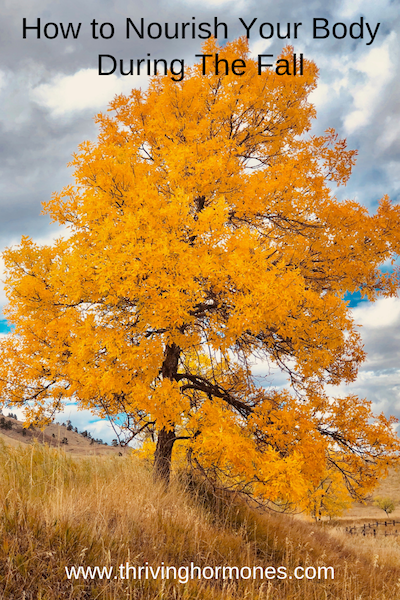How to Nourish Your Body During Fall
Fall has arrived, and the hot summer days gradually become shorter. We welcome cooler air, and the leaves begin to change, presenting us with their colorful foliage before they start to fall off the trees to prepare for the coming winter. The cold air signals us to start putting away our light summer clothes and get out heavier and warmer clothes for colder weather. Fall is a time of harvest and gathering of the beautiful and bountiful, brightly colorful squashes, pumpkins and root vegetables so that they can be put away for winter.
This time of the year we start to be more introspective, and we are getting ready for the darker energy of the winter. This a time to spend more time with ourselves and be mindful about making self-care rituals a top priority so our body and mind will be ready for cold months ahead.
According to Traditional Chinese Medicine (TCM), is it is crucial to adapt your diet to the seasons to achieve physical and mental health throughout the year.
With the change of seasons also comes a change in our body’s energy known as qi. Our body can get out of balance during this transition. It is wise to take take the necessary steps to make the adaptation process more manageable for us in order to protect ourselves from getting sick.
Eating according to seasons is an essential part during seasonal transition. It helps us maintain the balance of the yin and yang, the polar energies that work in synergy to keep us healthy, and it provides the necessary nutrients to the body to fight any of the infections.
During the transition from warm weather to colder temperatures, our bodies start craves warmer foods to cope with the environmental changes. By providing the body with warming ( known as yang) foods, we help the body to combat the cool temperatures. By doing so, you balance the yin and yang.
As the outside temperature decreases, you want to warm the body from the inside, and this is made possible by nourishing ourselves with foods that maintain the body’s internal heat. Have you ever noticed that when you have ice cream in winter, you start to feel cold from the inside? This is because the yin (male) has become more dominant in the body, leaving you feeling cold and out of balance. In winter, the aim is to strengthen the yang, as this will keep the qi balanced and your health in check.
Following the guide below, our organism will be able to adapt smoothly to the change of season and combat anything that comes its way. You will naturally feel more connected to yourself, on a mental, physical and emotional level.
Eat locally and seasonally
Eating this way will provide you with the necessary nutrients to be healthy during the fall. Eat heartier food such as grains, legumes, root vegetables, good fat especially if you live in colder climates. Make soups, stews, sauteed dark leafy greens or roasted the veggies. The longer cooking time supports our digestive system during the fall. This process will warm the body from the inside, strengthen your immune system, keep your energy levels up, and beat cravings.
Autumn foods to look out for:
Sweet Potato
Ginger
Onion
Pears
Pomegranate
Garlic
Pumpkin
Spinach
Beets
Carrots
Persimmons
Mushrooms
Leek
Radish
Broccoli
Green beans
Avocado
Apple
Grapes
Use warming spices such as ginger, cayenne, turmeric, cinnamon, nutmeg, cardamom and ginger in your cooking or teas. Make your own spice blends and add it to your dishes.
Healthy fats like grass-fed butter, avocado oil, hazelnut oil, coconut oil, nuts and seeds, olive oil are your allay at this time of the year. Studies keep showing that healthy fats are vital for promoting cardiovascular health, brain health, healthy weight and keeping our bodies nourished. Add some coconut oil to your oatmeal or hot chocolate, add ghee to your morning coffee or tea, a, or massage your body with avocado oil because it is important to keep your body fed and moisturized during that time of the year.
In Chinese medicine, fall is associated with metal and the lungs. This season focus on protecting boundaries and organization. During the fall we move from expansive and external energy of summer to the internal, contractive nature of fall. The energy of autumn and the lungs is “letting go,” so during the fall, it is wise to be mindful and to let go of anything that doesn’t serve you or may be holding you so you can make room for new experiences that will help us to learn and grow.
The emotion connected to lungs is grief and sadness.
The lungs are associated with communication and clear thinking, being open to new ideas, having a positive self-image, and have the ability to relax, letting go and be happy. When your lungs are out of balance, or you are dealing with too much grief, and you will have difficulty coping with change and loss, a sense of alienation, and experience a prolonged sense of sadness that does not ease.
Attachment is associated with the lungs also. During the fall would be a good practice to let go of experiences, people, thoughts, objects, and the past. If the energy (or qi) of the lungs is weak, you can experience an consistent and overwhelming state of grief that does not ease. This deficiency, if prolonged, can lead to depression, anxiety, and other issues.
Allow this energy to move and try to express it fully – this will help you to strengthen you both physically and psychologically. Don’t avoid grief, but try to deal with it in a healthy way, which is a key to being healthy, happy and maintain balance in life.
Breath deeply and practice some breathwork that will help you move those emotions and feel in balance. That is how you also strengthen your lungs and keep them healthy. Breathe deeply with intention. Breathing will help flood our cells and brains with very much needed oxygen, which is vital to all the body’s processes. Go for a walk outside or a run in the crisp, clean autumn air, and fill your lungs with all that air and good qi.
Stay active because that will help to move your lymphatic system that during the colder months is more stagnant, which can slow down our circulation and metabolism, and can weaken our immune system.
You can still bike, go for a walk or a hike, and take full advantage of the beautiful outdoors before winter’s arrival.
The Large Intestine carries the yang (female) energy. The large intestine works with the lungs to keep the body in balance.
The large intestine job is letting go of the waste and toxins. It removes everything the body doesn’t need, cleans and releases it, only keeping what is necessary and the most important for our body to function. That is why autumn is an excellent time to let go, look at things that are not working, evaluate our life so we can give them away for good. When people have problems with elimination, they might have issues letting go.
Stay in tune with nature helps us to be in tune with ourselves. During autumn consider creating rituals of celebration or around the fall equinox, play with the leaves or gather with friends.
Boost your immune system with adaptogens like medicinal mushrooms, echinacea or ginger.
Sleep with the natural cycles.
It is natural that during the fall the days are shortening. Nature goes to sleep too, trees shed their leaves and animals hunt and gather in preparation for cold months and winter. Nature is telling you to nourish ourselves, slow down, and get some quality sleep.
By incorporating hygiene practices, taking herbs like valerian, chamomile or passionflower will help you to improve the quality of your sleep.
During this fall take care of yourself and make time for yourself! I hope these tips help you maintain wellness so you can fully enjoy the full beauty of fall.
Warming Tea with Adaptogens
Ingredients:
• 3 tablespoons reishi mushroom
• 4 tablespoon astragalus root
• 1 tablespoon ashwaganda root
• 1 tablespoon cinnamon chips
• 1 tablespoon burdock root
• 1 tablespoon dried dandelion
• 2 teaspoons dried ginger (or 1 inch of sliced fresh ginger)
• 5 cardamon pods, crushed
• ½ tsp cloves
• 2 cups water
• 2 cups milk (dairy or non-dairy)
Directions:
1. Combine reishi, astragalus, eleuthero/ashwaganda, burdock, dandelion and water in a pot.
2. Bring to a gentle simmer for 20 minutes.
3. Add remaining herbs and milk, and heat for another 15 minutes.
4. Strain herbs and serve with maple syrup or honey to taste and a dash of nutmeg on top, if desired.
5. Refrigerate unused portion and reheat later. Drink up to 3-4 cups throughout the day.
In Health,
Angie



